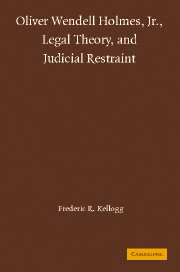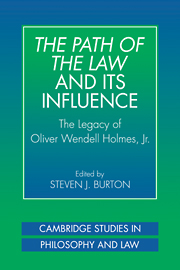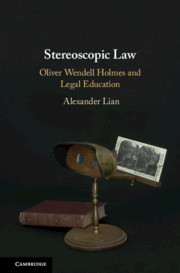Oliver Wendell Holmes, Jr., Legal Theory, and Judicial Restraint
Oliver Wendell Holmes, Jr, is considered by many to be the most influential American jurist. The voluminous literature devoted to his writings and legal thought, however, is diverse and inconsistent. In this study, Frederic R. Kellogg follows Holmes's intellectual path from his early writings through his judicial career. He offers a fresh perspective that addresses the views of Holmes's leading critics and explains his relevance to the controversy over judicial activism and restraint. Holmes is shown to be an original legal theorist who reconceived common law as a theory of social inquiry and who applied his insights to constitutional law. From his empirical and naturalist perspective on law, with its roots in American pragmatism, emerged Holmes's distinctive judicial and constitutional restraint. Kellogg distinguishes Holmes from analytical legal positivism and contrasts him with a range of thinkers.
- Looks at Justice Holmes as a seminal thinker, and explains common law and constitutional law
- Explains judicial restraint
- Elucidates historical and contemporary legal philosophy
Reviews & endorsements
"...is an impressive achievement: Kellogg brings a new and thought-provoking perspective to Justice Holmes, the most important figure in American legal history; the book sheds new light on Holmes's ideas and legacy."
--Professor Brian Bix, University of Minnesota Law School
"In this brilliant book, Frederic Kellogg revives a Holmes hitherto buried in the neglect of Holmes' doctrinalism--indeed in the neglect of doctrinal argument as a fundamental method of constitutional construction. Here we see the Holmes who brought the common law tradition of deciding appeals to constitutional adjudication. It is a tour de force."
--Professor Philip Bobbitt, University of Texas Law School
"Can Justice Holmes add insight to...contemporary debate? For Professor Kellogg the answer is an emphatic 'yes.'"
--Stuart Shiffman, American Judicature Society
"...Kellogg does an excellent job of laying out some of the great challenges for philosophers of law and of showing that one great American figure was more consistent in his intelligent response to these challenges than has been recognized thus far in scholarship.... Kellogg reveals several ways in which Holmes’s work has insight to offer for contemporary debates in legal philosophy. Philosophers of law, of pragmatism, and of politics will benefit from Kellogg’s in-depth study and defense of Holmes."
--Eric Thomas Weber, University of Mississippi, The Pluralist
Product details
December 2006Hardback
9780521866507
222 pages
229 × 152 × 14 mm
0.47kg
Available
Table of Contents
- 1. A time for law
- 2. Playing king
- 3. Holmes's conception of law
- 4. Common law theory revisited
- 5. Holmes and legal classification
- 6. The general theory of liability (and its critics)
- 7. Morals and skepticism in law
- 8. Judges, principles, and policy
- 9. Common law constitutionalism
- 10. Holmes's theory in retrospect.




